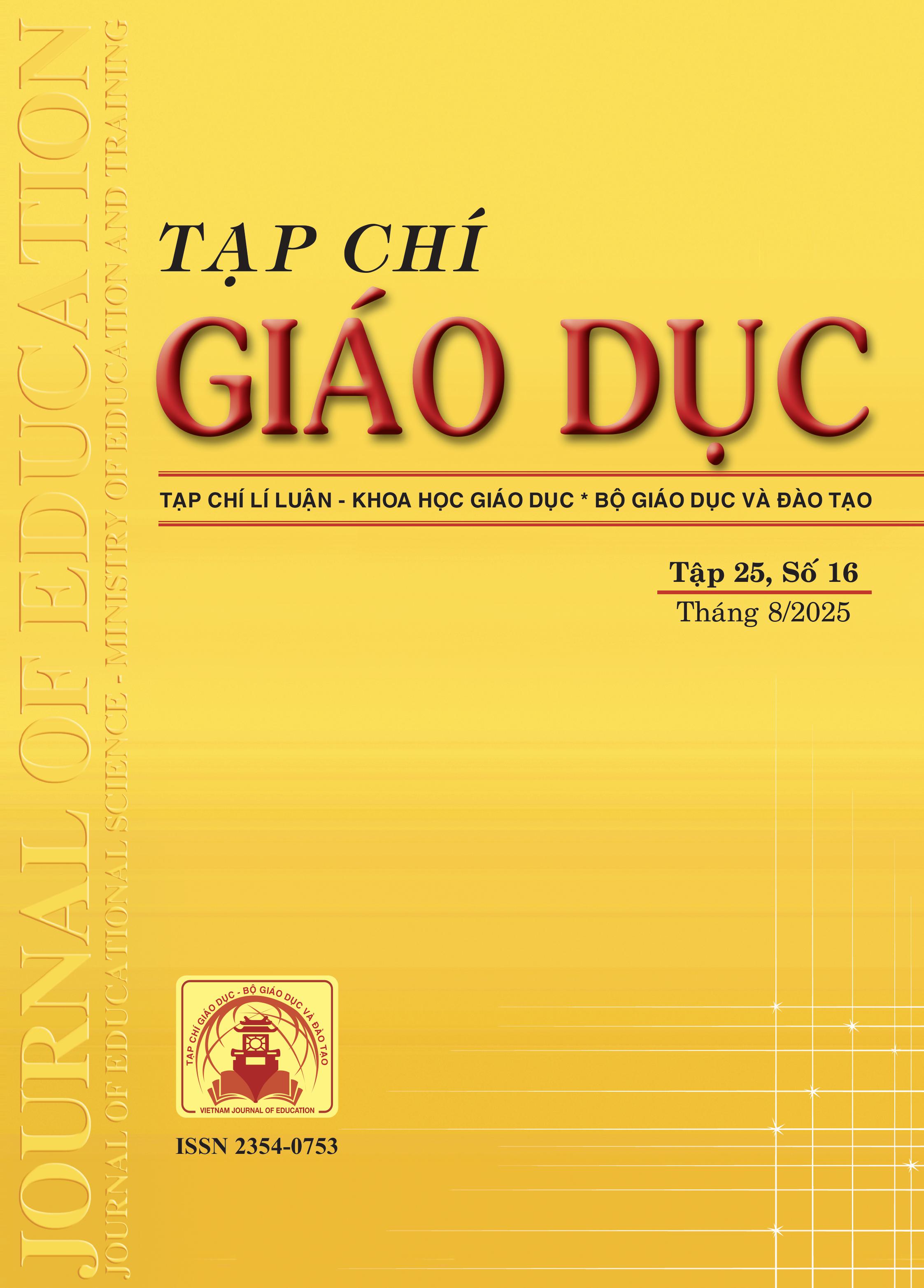Dạy học khám phá trong môn Khoa học tự nhiên để phát triển năng lực tìm hiểu tự nhiên cho học sinh trung học cơ sở
Tóm tắt
The competency to explore nature is one of three specific competencies to be formed and developed for students in teaching the Natural Sciences subject. This article proposes a classification framework and instructional guidelines for developing scientific inquiry competence in the science subjects, aligned with Vietnam’s 2018 General Education Curriculum. The framework was developed based on a synthesis of IBL theories, analysis of international curricula, and outcomes from an expert consensus procedure. The study identifies five core types of inquiry-based activities: (1) (formation of) basic skills; (2) observation and exploration; (3) secondary research; (4) experimentation; and (5) product development. These types are structured into a hierarchical model that reflects the vertical progression of students’ scientific inquiry competence. In addition, the article introduces a pedagogical guidance matrix using an open–close continuum for each competence indicator, clarifying the roles of teachers and students at various stages of inquiry. The proposed theoretical framework offers a foundation for lesson design, curriculum and assessment tools development in science education.
Tài liệu tham khảo
Ayuso Fernández, G. E., López-Banet, L., & Ruiz-Vidal, A. (2022). Students’ performance in the scientific skills during secondary education. EURASIA Journal of Mathematics, Science and Technology Education, 18(10), em2165. https://doi.org/10.29333/ejmste/12444
AQA Education (2016). GCSE Combined Science: Trilogy (Specification 8464, Version 1.0, for exams 2018 onwards). AQA.
Baur, A., Baumgartner-Hirscher, N., Lehtinen, A., Neudecker, C., Nieminen, P., Papaevripidou, M., Rohrmann, S., Schiffl, I., Schuknecht, M., Virtbauer, L., & Xenofontos, N. (Eds.). (2022). Differentiation in inquiry-based learning: A differentiation tool with a focus on experimentation (1st ed.). Heidelberg University of Education. https://doi.org/10.5281/zenodo.6419564
Bộ GD-ĐT (2018). Chương trình giáo dục phổ thông môn Khoa học Tự nhiên (ban hành kèm theo Thông tư số 32/2018/TT-BGDĐT ngày 26/12/2018 của Bộ trưởng Bộ GD-ĐT).
Brandon, R. (1994). Theory and experiment in evolutionary biology. Synthese, 99, 59-73.
Bruner, J. S. (1960). The process of education. Harvard University Press.
Cambridge Assessment International Education (CAIE). (2022). Cambridge IGCSE Co-ordinated Sciences (Double Award) 0654 syllabus for 2025, 2026 and 2027. Cambridge University Press & Assessment.
Chen, J.-H., Qin, L.-X. (2023). Expert consensus—promoting clinical excellence and ultimately benefitting patients. Hepatobiliary Surgery and Nutrition, 12(5), 743-745. https://doi.org/10.21037/hbsn-23-435
European Commission (2016). Strategies for Assessment of Inquiry Learning in Science (SAILS). CORDIS.
Government of Western Australia (2020). Types of science inquiry investigations.
Hoàng Mai Minh Quân, Phạm Nguyên Chương, Nguyễn Quốc Bảo, Nguyễn Thanh Loan (2023). Tổ chức dạy học khám phá nội dung “Công và năng lượng” nhằm phát triển năng lực Vật lí cho học sinh lớp 10 theo Chương trình giáo dục phổ thông 2018. Tạp chí Khoa học, Trường Đại học Sư phạm Thành phố Hồ Chí Minh: Khoa học Giáo dục, 20(8), 1353-1364. https://doi.org/10.54607/hcmue.js.20.8.3410
Kelley, T. R., & Knowles, J. G. (2016). A conceptual framework for integrated STEM education. International Journal of STEM Education, 3(1), 11. https://doi.org/10.1186/s40594-016-0046-z
OECD (2023). PISA 2025 Science framework. https://pisa-framework.oecd.org/science-2025/
Pedaste, M., Mäeots, M., Siiman, L. A., de Jong, T., van Riesen, S. A. N., Kamp, E. T., Manoli, C. C., Zacharia, Z. C., & Tsourlidaki, E. (2015). Phases of inquiry-based learning: Definitions and the inquiry cycle. Educational Research Review, 14, 47-61. https://doi.org/10.1016/j.edurev.2015.02.003
Wickham, R. J. (2019). Secondary analysis research. Journal of the Advanced Practitioner in Oncology, 10(4), 395-400. https://doi.org/10.6004/jadpro.2019.10.4.7
Wooding, S., Cullinane, A., & Erduran, S. (2020). Supporting the teaching of scientific methods in practical science. University of Oxford.
Yata, C., Ohtani, T., Isobe, M. (2020). Conceptual framework of STEM based on Japanese subject principles. International Journal of STEM Education, 7, 1-10. https://doi.org/10.1186/s40594-020-00213-2
Tải xuống
Đã Xuất bản
Cách trích dẫn
Số
Chuyên mục
Giấy phép

Tác phẩm này được cấp phép theo Ghi nhận tác giả của Creative Commons Giấy phép quốc tế 4.0 .












